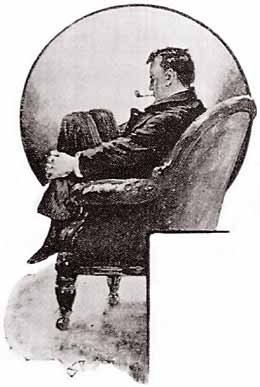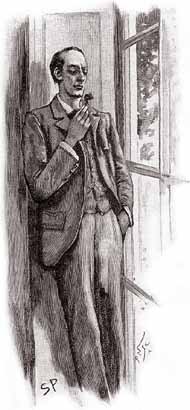Sherlock Holmes was famously unappreciative of Dr. Watson’s literary efforts on his behalf. Though it stands to reason that Watson’s published stories about Holmes and his adventures brought the Great Detective both notoriety and new clients, Holmes was more concerned about the manner in which his talents were perceived: “Detection is, or ought to be, an exact science and should be treated in the same cold and unemotional manner. You have attempted to tinge it with romanticism, which produces much the same effect as if you worked a love-story or an elopement into the fifth proposition of Euclid” (SIGN). But Watson was undeterred by his friend’s distinct lack of enthusiasm, and of the fifty-six short stories and four novels in the canon, only four of them are not written from the Doctor’s perspective. “The Blanched Solider” and “The Lion’s Mane,” from The Casebook of Sherlock Holmes, are written from Holmes’s perspective; and “The Mazarin Stone” and “His Last Bow” are written from a third person perspective. And in “The Gloria Scott,” and “The Musgrave Ritual,” Sherlock Holmes relates the primary mystery to Watson from his own memories, but the Doctor still frames and narrates the initial story.
 |
| "I was annoyed at this criticism of a work which had been specially designed to please him" (SIGN). |
“In the course of two sentences, fifty minutes have passed, yet all the reader receives, and all Watson seems to think about, are the particulars of Holmes’s odd physical position on the couch. Rather than speculating about Holmes’s thoughts, or about the case, Watson apparently just sits and stares at Holmes. While a more imaginative narrator, or one more interested in intellectual acts, might speculate on Holmes’s thought process, Watson just gazes at Holmes’s body until the sight puts him to sleep.”
It’s hard to forget that Dr. Watson is oftentimes the reader’s only access to Sherlock Holmes. He is the one that introduces the audience to the Detective, and Dr. Watson is the one that parcels out information in whatever size literary morsels he deems fit. And Krasner believes that this is sufficient reason for the reader to be resentful, or even angry, at the Doctor, because “…just when Holmes is at his most brilliant, Watson turns his gaze to the angle of his pipe or the color of his dressing gown.” But as a writer and a reader himself, Watson was uniquely aware that the building blocks of a narrative are contained, not just within each individual story as it is told, but across the series of stories that will ultimately be conveyed.
In A Study in Scarlet, Watson introduces the reader to Sherlock Holmes for the first time. From the manner in which he chooses to title his very first chapter (“Mr. Sherlock Holmes”), the reader is instantly aware around who this narrative will focus, at who the reader’s attention should be intrinsically drawn. I’ve spoken elsewhere of Holmes and Watson’s first meeting, and how the scene forever colors the ways we perceive both men. When Watson first sees Holmes, he is alone and consumed by his work, much as Sherlock Holmes will always be throughout their partnership. Furthermore, Watson states that Holmes shook “…my hand with a strength for which I should hardly have given him credit.” With this statement, Watson lays the foundation of Sherlock Holmes as a man of mysterious and unassuming strength. This characteristic may not manifest itself to its fullest extent in STUD, but it becomes a brick upon which Watson can build off of in other stories. In “The Speckled Band,” Holmes untwists the cast-iron fireplace poker which the villainous Roylott had destroyed (“I am not quite so bulky, but if he had remained I might have shown him that my grip was not much more feeble than his own”); and in “The Three Gables,” Holmes easily fends off an aggressive and agitated prizefighter (“But he is really rather a harmless fellow, a great muscular, foolish, blustering baby, and easily cowed, as you have seen”). Watson started weaving the fabric of this aspect of Holmes’s character in the very first story, in the very first chapter, even though he did not use it to its fullest ability until later in the canon.
And Watson is not just aware of how to present Holmes’s skills as a detective, but also aspects of his personality—those particularly enticing clues that so tantalize the reader. In “The Naval Treaty,” a story from The Memoirs of Sherlock Holmes, the Detective delivers a seemingly uncharacteristic, philosophical soliloquy on the nature of—of all things—flowers:
“What a lovely thing a rose is! […]There is nothing in which deduction is so necessary as in religion…It can be built up as an exact science by the reasoned. Our highest assurance of the goodness of Providence seems to me to rest in the flowers. All other things, our powers, our desires, our food, are all really necessary for our existence in the first instance. But this rose is an extra. Its smell and its colour are an embellishment of life, not a condition of it. It is only goodness which gives extras, and so I say again that we have much to hope from the flowers.”
It’s certainly an odd tangent for a man who once claimed to not know that the sun revolved around the earth, simply because the information was not relevant to his work (STUD). What use could philosophy and existential meditations on nature have in Holmes’s often vaunted “Science of Deduction”? But if nothing else, this monologue puts softer edges on the detective, making him seem more human and aware of life’s delicate—often superfluous—details; things that are good, simply for the sake of being good. And so the path is paved for Watson to present the reader with an entirely different aspect of Sherlock Holmes, one that isn’t much seen until “The Three Garridebs,” when Watson is injured. Holmes shouts, “You’re not hurt, Watson? For God’s sake, say that you are not hurt!” and perhaps there is a subtle reminder of the Detective from NAVA, who spoke so eloquently about the goodness of “extras,” and the reader wonders if the Doctor is not an “extra” himself, or perceived as one, in some way.
In short, Watson knows exactly what he’s doing as a narrator, and a writer. He may not always be present—or even awake—when the reader would like him to be, but he sees the larger picture and understands what he needs to do. In MAZA, Holmes tells his biographer: “Watson…you have never failed to play the game. I’m sure you will play it to the end.” Particularly in the very early stories, Watson is constantly leaving clues and signs that lead the readers on the path to Sherlock Holmes’s true nature, making the definitive character of the Great Detective as much of a mystery or a challenge as any of the canon’s adventures.
oOo
There are two weeks left to enter the Sherlock Holmes trivia contest, and now, there’s a new way to win! Win a prize package of reference works by showing off your knowledge of the Detective, his world, and his creator.



Bravo! Watson, as narrator, leaving carefully managed clues to the mystery that is Sherlock Holmes--a wonderful conclusion and an extended metaphor that I will ponder from now on when reading the canon. As in the best mysteries, the detective seems to work out the solution right along with the reader, and so it is with Dr. Watson and "The Case of the Real Sherlock Holmes."
ReplyDeleteThank you for printing the passage and illustration from 'The Naval Treaty' that are my dearest clues to the real Holmes. There is always something "extra" about Holmes himself--a beauty and goodness resting deep in his prismatic soul--which his devoted friend Watson faithfully endeavors to show us. In that, I trust him completely.